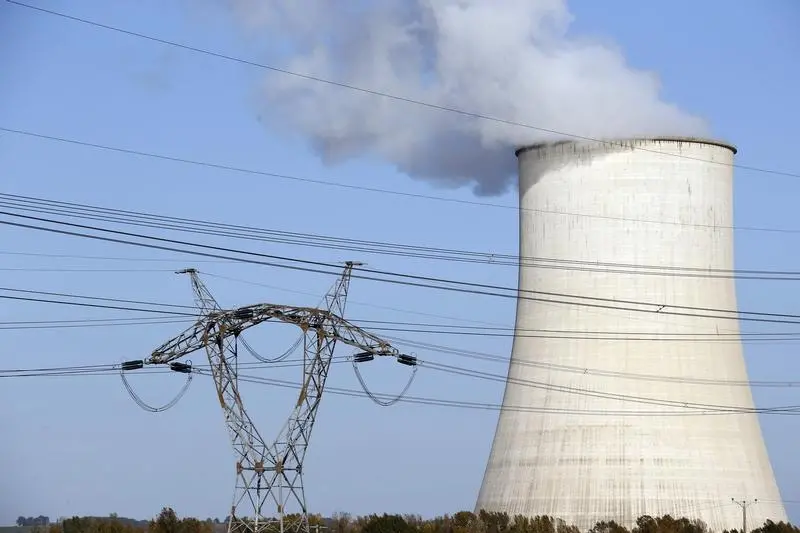PHOTO
PARIS- Rosatom is in talks with Jordan to revive a deal to build a nuclear plant in the kingdom, according to the deputy CEO of the Russian company, which is looking to add another nuclear newcomer nation to its customer list.
The state-owned firm is the clear leader in the global nuclear industry after two of its biggest rivals, Areva and Westinghouse, hit financial troubles, and it has a track record of building plants in countries without any nuclear tradition.
Russia signed an intergovernmental agreement with the Middle Eastern country in 2015 to build a $10 billion facility, but there has been little progress since and in recent weeks there have been local media reports that Jordanian authorities have scrapped the deal.
Kirill Komarov, deputy CEO of Russian state nuclear firm Rosatom, told Reuters that talks were still ongoing to resolve technical and financing issues, without elaborating.
"The Jordan deal was definitely not scrapped. Maybe we need some more time with our Jordanian colleagues," Komarov said. He added Jordan was a difficult place for nuclear as a large part of the country was desert and a reactor needs lots of water for cooling.
He said that one of the options being considered was to build a smaller reactor than originally envisaged - a so-called "small modular reactor" rather than a conventional one.
Industry experts say the main snag for the tender won by Rosatom was disagreements between Jordan and the Russian company over how the project should be financed.
A senior source in the Jordan Atomic Energy Commission told Reuters the original project had been put on hold and now both parties were exploring the feasibility of constructing a small modular reactor.
Eight years ago, France's Areva was also in the running in Jordan, but it has since had a government bailout. Renamed Framatome, it is now part of utility EDF EDF.PA .
The other big Western reactor builder, Toshiba-owned 6502.T U.S. firm Westinghouse, has been in bankruptcy for more than a year, limiting is ability to pursue foreign contracts.
With Chinese and South Korean vendors lacking much experience with building reactors abroad, that has left the field open for Rosatom.
The Russian firm has an order book worth $134 billion and contracts to build 22 nuclear reactors in nine countries over the next decade, including Belarus, Bangladesh, China, India, Turkey, Finland, Hungary, Egypt and Iran.
Framatome has one contract in its order book, for a nuclear plant in Hinkley Point, Britain. Westinghouse not a single one.
The biggest challenge to Rosatom's business could come from China in coming years, according to industry experts.
China has the ambition to become a top nuclear vendor through its state-owned companies, even if it has little experience in building reactors abroad.
With a deal to fund EDF's project Hinkley Point project in Britain and later build its own reactors there, China has a foot in the door in a top European energy market, and it has signed cooperation agreements in several countries without nuclear.
"China has the ability and the appetite to export nuclear," said George Borovas, head of nuclear at law firm Shearman & Sterling. "I expect them to become very competitive in the global market."
NEW-BUILD CONTRACTS
Rosatom has won most major global new-build contracts over the past decade.
In Turkey, a country with huge energy needs, Rosatom won a $20 billion contract eight years ago to build, own and operate four reactors in Akkuyu, on the Mediterranean coast.
Concrete on unit 1 was poured in April and Komarov said Rosatom has already invested $3 billion. But it is still looking for a partner to take a stake of up to 49 percent.
Komarov said Rosatom is looking for a partner who can bring financing but also some industrial skills, construction skills and an understanding of Turkish energy markets.
He said Rosatom has held talks with several firms in Turkey and the Middle East, and that Rosatom is still targeting startup for 2023, the centenary of the Turkish republic.
Industry experts say Rosatom's key advantage is the range of options it can provide. Unlike Westinghouse and Areva, Rosatom has the experience and financial clout to not only sell reactors but also to build the entire power plant around it.
Areva, following its bailout, was split up in fuel group Orano and reactor builder Framatome, leaving Rosatom as the world's only integrated nuclear firm, with a one-stop shopping model from uranium enrichment to nuclear waste handling.
"Rosatom's flexibility to offer different contracting methods and scenarios to suit the particular risk-taking and financial capabilities of each country, is a very smart way of approaching this industry," said industry lawyer Borovas.
(Reporting by Geert De Clercq; Additional reporting by Suleiman Al-Khalidi in Amman; Editing by Pravin Char) ((geert.declercq@thomsonreuters.com; +33 14949 5343; Reuters Messaging: Twitter: @gvdeclercq))





















